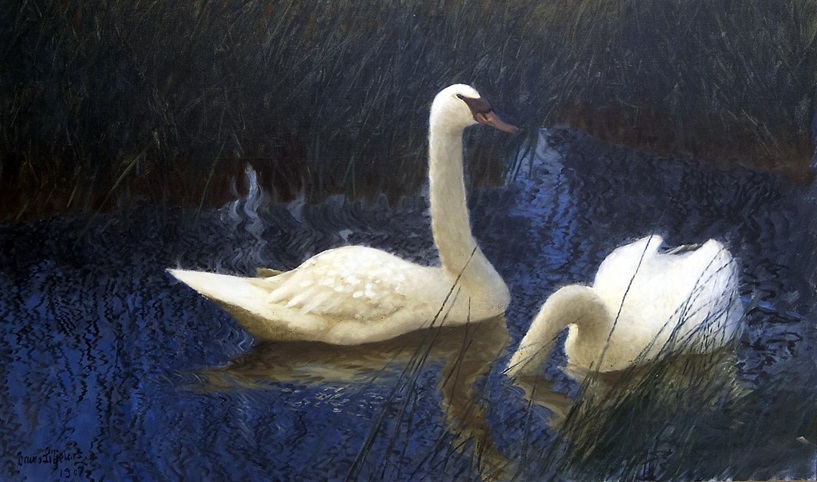.
Madrigal à la Tasso
The surface of the lake reflects the flight
_Of one and then another swan;
_How it would add to my delight
__To know where each has gone,
_As when, my love, I look upon
Those rapid thoughts which pass from left to right
_Across the azure of your eyes,
_And know, and know the very nest
__Towards which each one flies
Is that which I have woven in my breast.
.
.
Daniel Joseph Howard studied law in his native Ireland, earned an MA in philosophy at King’s College London and worked for the European Commission. He is currently a pensionnaire étranger at the École Normale Supérieure in Paris, as well as a Teaching Fellow and PhD candidate in the United States.




Thank you, Daniel. So beautifully and delicately expressed.
Thanks for your kind words, Bruce.
I must confess that the poem would have been more “à la Tasso” had it replicated his tendancy to melancholy. For instance, the madrigal might have contrasted the delight of seeing the swans in flight with the despair inspired by an analagous phenomenon. Such a contrast might have better inspired the ‘meraviglia’ that Tasso intended to evoke in his poetry:
The surface of the lake reflects the flight
Of one and then another swan;
It would have doubled my delight
To guess where each has gone,
Had not, my love, I looked upon
Those rapid thoughts which pass from left to right
Across the azure of your eyes,
Knowing, knowing the very nest
Towards which each one flies
Is not the one that lies within my breast.
Daniel, I have to say, before I read the comments, I already liked what I saw as the sweet naivety of the man assuming the woman’s thoughts were all about him. Sort of like the sentiment in Shakespeare’s “When my love swears” (https://www.poetryfoundation.org/poems/50386/sonnet-138-when-my-love-swears-that-she-is-made-of-truth). Either way, it’s beautiful how you’re watching her thoughts go back and forth between her eyes – and the naivety of lovers (although of course it could very well NOT have been naive at all 🙂 is a wonderful thing!
Thanks Jeremiah. I would love to know whether Shakespeare’s pairing of ‘lies’ and ‘subtleties’ was a phonetic or merely an eye-rhyme. One comes across the same kind of ‘rhyme’ quite often in Elizabethan poetry.
This is a fascinating metaphor comparing the flight of swans across a lake to the “flight” of thoughts across eyes. I love that it starts out with a concise mention of the reflection of the swans in the lake, because it’s a lovely image we can all imagine, yet probably few have thought to describe. I also like the originality of the varied line lengths which, nevertheless, have a pattern.
Thanks for your comment, Cynthia. Indeed it is characteristic of Tasso’s madirigals to have lines of varying length, though he typically favoured seven-syllable lines with occassional eleven-syllable lines (Italian naturally lending itself to feminine endings).
As a pastoral dialogue:
Girl: The surface of the lake reflects the flight
Of one and then another swan;
How it would add to my delight
To know where each has gone!
Boy: Then turn to me and look upon
The rapid thoughts which pass from left to right
Across the azure of my eyes:
Yours is the place of rest
Towards which each now flies
To make therein his first and final nest.
Perhaps the most beautiful poem I’ve read lately. The azure of the beloved’s eyes equals the surface of the lake, and the swans equal her thoughts. Such an incredibly unique metaphor. Your brilliance is unparalleled, Daniel. Truly a memorable poem. Thanks for sharing it with us.
Thank you Shamik, you are much too generous. Glad you enjoyed it.
A beautiful poem. The enticing mystery of the lover’s darting eyes reminds me a little of the Kate Wolf song subtitled, “In a Woman’s Heart There Are Places No One Knows”.
Thanks, Daniel. I hadn’t heard of that song before – I’ll give it a listen now.
It’s good to see an original madrigal, Daniel, and you are kind to provide the melancholy and dialogue variations as well. Skillful poetic games!
Thanks for your comment, Margaret. The madrigal is a very interesting and flexible form; yet it is not very widespread in the canon of English poetry.